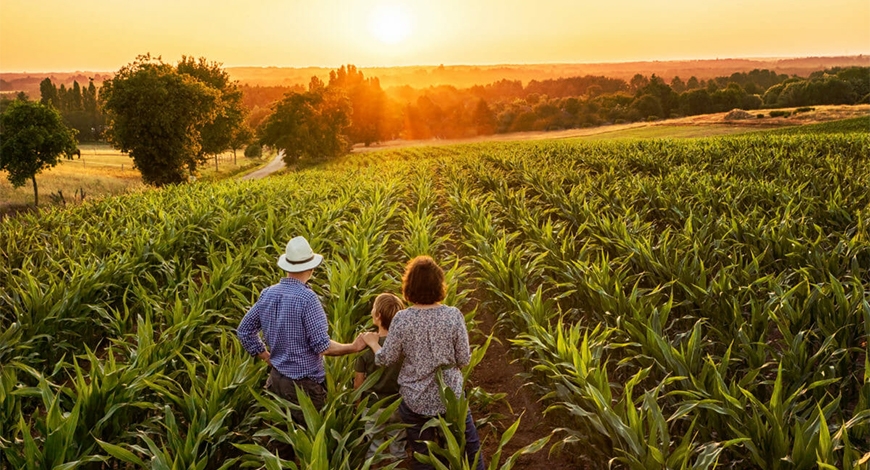The importance of family farming in Brazil

27/07/2021
The importance of family farming in Brazil
Family farming is responsible for the production of most of the food available for consumption by the Brazilian population. For Souza (2021), family farming carries the responsibility of putting food on the Brazilian table and income for rural families. However, Souza (2021) reminds us that its value goes beyond comparisons with other modalities of food production, its value is indisputable.
To start talking about family farming we must first define its concept. We will use what is established in Law n°11.326, of July 24, 2006, which constitutes the guidelines for the formulation of the National Family Farming Policy and rural family enterprises.
⠀⠀⠀⠀⠀⠀⠀⠀⠀
The law considers a family farmer and a rural family entrepreneur to be someone who practices activities in rural areas and simultaneously meets the following requirements:
⠀⠀⠀⠀⠀⠀⠀⠀⠀
I - does not hold, for any reason, an area larger than 4 (four) fiscal modules;
II - uses predominantly the family's own labor in the economic activities of its establishment or enterprise
III - has a minimum percentage of the family's income originating from economic activities in its establishment or enterprise, as defined by the Executive Branch;
IV - manages his establishment or enterprise with his family.
⠀⠀⠀⠀⠀⠀⠀⠀⠀
With the technical progress, which makes it unnecessary for all family members to work in the field, the evolution of non-agricultural rural employment has represented an opportunity to increase the family income of many families. However what we see in Brazil is that family farming plays a very important role, follow some numbers from the last Agricultural Census conducted by IBGE in 2017.
⠀⠀⠀⠀⠀⠀⠀⠀⠀
- In Brazil 77% of agricultural establishments can be classified as family farming.
- The North, Northeast, and some parts of the South are where most of these properties are concentrated.
- Family farming employs 10.1 million people.
- In area extension, family farming occupied 80.9 million hectares in 2017, corresponding to 23% of the area of all agricultural establishments.
⠀⠀⠀⠀⠀⠀⠀⠀⠀
The Agricultural Census also identified that family farming is responsible for producing about 70% of the national beans, 34% of rice, 87% of cassava, and 60% of milk production, in addition to excelling in dairy farming, beef cattle, pigs, and poultry. Souza (2021) explains that transforming the information from the 2017 Census into the value of family farming production means that R$ 107 billion comes from this production system, which is equivalent to 23% of all Brazilian agricultural and livestock production.
⠀⠀⠀⠀⠀⠀⠀⠀⠀
Recognizing the importance of family farming, much has been done with public policies aimed at this production system to continue producing and generating wealth, in addition to encouraging the democratization of production processes in the rural sector.
⠀⠀⠀⠀⠀⠀⠀⠀⠀
Because these activities are so important for feeding the population, these producers need incentives and guarantees to continue the work of family farming and extractivism, explains Souza (2021).
⠀⠀⠀⠀⠀⠀⠀⠀⠀
However, it can be seen that there are still countless challenges for family farmers. They need a global vision and macroeconomic policies that encourage productivity and the entry of their products into the market, access to information, the adoption of technological solutions to strengthen the segment, legal security, policies to encourage young people to stay in the field, and the fair distribution of resources for investments. These are some fundamental points for the construction of a more sustainable family agriculture in our country.
⠀⠀⠀⠀⠀⠀⠀⠀⠀
Family farming is important for Brazil because the majority of these families use their resources to explore the natural riches in a sustainable way, protecting the environment, generating wealth, employing, reducing social inequalities, strengthening regional economies, and constantly innovating. In other words, family farming is important for the economy, for food distribution, for society, for maintaining cultural traditions, and for the environment.
⠀⠀⠀⠀⠀⠀⠀⠀⠀
By: Brasélio Team
⠀⠀⠀⠀⠀⠀⠀⠀⠀
⠀⠀⠀⠀⠀⠀⠀⠀⠀
References:
BRASIL. Lei n° 11.326, de 24 de julho de 2006. Estabelece as diretrizes para a formulação da Política Nacional da Agricultura Familiar e Empreendimentos Familiares Rurais. Brasília: Planalto, 2006. Disponível em: http://www.planalto.gov.br/ccivil_03/_ato2004-2006/2006/lei/l11326.htm
IBGE - INSTITUTO BRASILEIRO DE GEOGRAFIA E ESTATÍSTICA. Censo Agropecuário 2017. Disponível em: https://censos.ibge.gov.br/agro/2017/resultados-censo-agro-2017.html. Acesso em: 25 jul. 2021.
SOUZA, Ênio Carlos Moura de. Agricultura Familiar e Sociobiodiversidade nas Políticas Públicas do Governo Federal. Boletim da Agricultura Familiar / Companhia Nacional de Abastecimento. v.1, n.1, p. 8-15, 2021. Brasília: Conab, 2021.
related articles

25/06/2021
Entrepreneurship in the field - innovating is necessary!
Entrepreneurship continues to be an important subject, because entrepreneurship generates a positive impact on the economy of any country, and when...
read more






